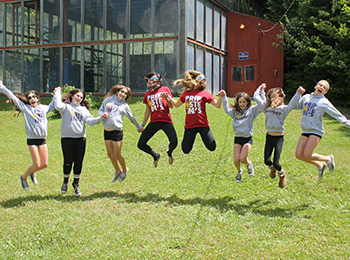MONTREAL — Pripstein’s Camp Mishmar, the last of the private, co-ed sleepaway camps in Quebec's Laurentians vacation are that catered to an anglophone, mainly Jewish, clientele has closed after 74 years.
Majority owner Ronnie Braverman, grandson of founders, Chaim and Pearl Pripstein, said enrolment has been declining at the camp since the Parti Québécois was first elected in 1976 and the anglophone exodus accelerated.
In the 1970s, families also began to stop sending their kids to camp for the whole summer, opting instead to spend part of the season on family vacations, said Braverman, who began working with his grandfather in the business 42 years ago.
He estimates 90 per cent of campers and 70 per cent of staff have been Jewish.
Over its history, Pripstein’s, as it is usually known, served more than 7,000 children and counsellors, he said. At its peak in the 1960s, there were an average of 240 campers. That number has dipped to as low as half that number, but has settled around 180 in recent years.
Early registration for the coming season was down to the point where Braverman realized the camp was no longer economically viable.
The demographics are simply not there. Braverman estimates that two-thirds to three-quarters of former campers and counsellors, the most ready source of a new generation of customers, are not living in Montreal anymore, he said.
The camp is located on 200 acres in St. Adolphe d’Howard, about an hour north of Montreal.
“When I first joined my grandfather in the business over 40 years ago, the Laurentians were one of the booming centres of the Canadian camping scene,” he said. “There were over a dozen privately operated, co-ed English camps dotting the countryside.”
They have all disappeared. Among the best known are Hiawatha, Pembina, Bayview, Panorama and, in more recent years, Pine Valley and Maromac, which also catered to a mainly Jewish clientele. By 2007, Pripstein’s was the only one of its kind still operating, Braverman said.
He did try recruiting campers from abroad, and some from the United States, Latin America, Europe, Israel, Asia and, surprisingly, Saudi Arabia, did enrol – but not enough.
“Another hit to the business side was the introduction of the GST and PST sales taxes,” he said. “We lost 20 families the first year of the GST, who fled to nearby American camps, which had, and still have, no sales taxes. We were forced to eat the taxes to maintain market share, and this obliterated much of our profit margin.”
Pripstein’s also targets middle-class families. The wealthy tend toward prestigious camps in the United States, and those of lower incomes go to community-subsidized camps, he pointed out.
Among the more famous Pripstein’s alumni that come to Braverman’s mind are singer-songwriter Leonard Cohen, who was a counsellor in 1958; Indigo bookstores head Heather Reisman, who was a camper; former senator Hugh Segal taught photography there; and, from a younger generation, novelist Sarah Mlynowski.
Pripstein’s always had a strong sports program and attracted some top-flight staff, including Emerson Thomas, who played professional basketball in Europe, and Corey Pecker, who played professional hockey on that continent. Pecker ran Pripstein’s hockey camp. A summer-use ice rink was one of the innovations in which Braverman invested to try to keep the camp going.
Chaim Pripstein immigrated to Montreal from Poland before World War II. He was initially a teacher at the Talmud Torah, but when it could no long pay salaries during the Depression, he became a pedlar. His itinerary included the rural area around St. Jérôme, north of Montreal. He sometimes stayed overnight at a farmer’s house there, and in 1941, he hit on the idea of creating a modest summer-vacation pension for Montreal families in one of the farmer’s buildings, buying the food from him, Braverman related. Over time, it became solely a children’s camp.
When the North River on which it was located became polluted, Pripstein bought land on the camp’s current site further north, which has been added to over the years. The name Mishmar is derived from the Hebrew for standing on guard.
In the early years, the camp only served kosher meat, Braverman said, but Pripstein’s never had a hechsher. Over the years, that evolved into “kosher-style,” but rituals such as lighting Shabbat candles were maintained.
Since announcing the closure last month, Braverman said he has received “hundreds upon hundreds of heartfelt, nostalgic emails, phone calls, texts and Facebook posts from around the world, from campers, counsellors and parents.
“It’s nice to see we made an impact on so many people’s lives.”
Braverman has made arrangements with Camp Walden in Palmer Rapids, Ont., about four hours from Montreal to accept Pripstein’s campers and much of its staff. Owned by Sol Birenbaum and Howie Grossinger, Camp Walden is much larger, but can offer a similar camp experience and the owners are “friendly and caring people,” Braverman said.
